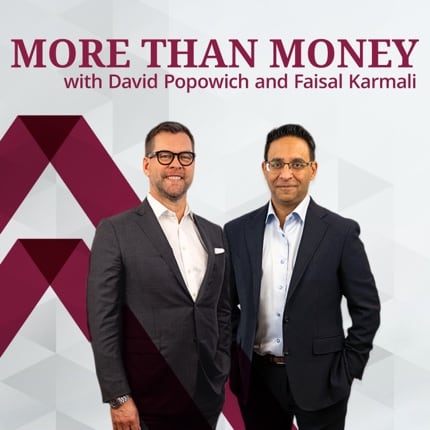Change is inevitable.
It is one of the only things we can count on in life. But change comes with some measure of uncertainty, and uncertainty often causes fear.
As portfolio managers, we have dedicated our careers to helping our clients navigate one of the biggest changes of their lives: retirement. And in our experience, everybody handles this transition differently. Some people plan and prepare and reach that milestone with a sigh of relief. Some take to retirement like it was second nature, or something they have been waiting for their entire lives. Others have a harder time letting go of their professional identity and coming to terms with their new reality.
So what separates those who thrive in their golden years from those who struggle with the adjustment?
We recently had the opportunity to speak with Dr. Robyne Hanley-Dafoe, educator, author, and resiliency expert, and she suggested that one determining factor for how well you navigate change is resiliency.
So if you are thinking about retirement and the fear is starting to creep in, what are some of the things you need to know about cultivating resilience?
It is important to acknowledge that any season of transition is going to make you feel a little unsure. That is a completely normal response to change. No matter how much planning you have done in advance, you have never actually retired. You do not know exactly what it is going to look like. You do not know exactly how it will feel to leave your job and a regular paycheque behind and start a new phase of life.
Change creates a reaction in our minds and bodies. It reminds us that we do not yet have the rules, the habits, or the routines to deal with this new thing, and it forces us to pay attention in order to form them.
According to Dr. Robyne, the people who struggle with change tend to ignore their body’s warning signs. They believe they can disregard the anxiety that they are feeling, or even think themselves out of it. However, an important part of weathering a change is holding space to recognize the uneasiness it causes. Sitting in that uncertainty is not easy.
We also asked Dr. Robyne about the people who seem to adapt to change effortlessly. What are the traits that make them resilient in seasons of transition?
Unsurprisingly, she noted that a lot of resiliency is tied to identity. As people transition out of roles that give them a sense of identity, they can start to see some friction.
Most people that show resilience in retirement do not base their identity on their job. We have all met those people who introduce themselves by telling you what they do for work, even without you asking. “Hi, I’m Kathy. I’m a lawyer” or “I’m John and I’ve been a teacher for almost 50 years.” Resilient people are people first and professionals second. They anchor their sense of identity and security in something broader than their jobs, and thus they are more flexible when it comes to transitioning into retirement.
Resilient people also have a strong home team. They have a community around them that helps them see themselves as more than just one thing. They are mothers, fathers, neighbours, or friends. So when they transition out of their careers, they still have these relationships to serve as identity markers.
Research shows that women tend to be more flexible and adaptable to change. Why is this?
Generally speaking, women are multitaskers. They rarely see themselves as just one thing. According to Dr. Robyne, women are more likely to carry the ‘invisible labour’ in their family systems and communities. They do a lot of the work that goes unacknowledged like taking care of children, doing the laundry, and cooking dinner.
Women also tend to have more social relationships outside of work. Men typically invest so much into their work that it plays a larger part in their identity. Work is where their friends are. It is where they find purpose in life. So when they retire, they no longer feel like a complete person.
If you are finding that retirement is shaking your sense of self, one of the transitional tools that Dr. Robyne recommended is giving back. Find ways to be of service. If you are struggling to let go of your professional identity, consider becoming a mentor. Mentorship can help you keep one foot in a familiar world while still having the freedom to explore the other options retirement has to offer.
And here is the good news: resilience can be learned.
It is one of the remarkable things about the human spirit. We are adaptable.
Change is scary, but not changing is even scarier. Imagine being stuck in time without the agency to reinvent yourself or imagine a new life for yourself. Now that is really frightening.
So how do you start cultivating resilience? It can be as simple as getting curious. Try out new hobbies, activities, and ways to find identity and meaning in retirement. Some will fit you and some may not. And that is okay! Retirement is a great space to experiment.
We could not let Dr. Robyne go without getting her top three tips for being more resilient as you transition into retirement. Here is what she had to say:
- Cope ahead of time: Do not wait for a transition to happen and then try to catch up or recover. We always feel better when we have a plan.
- You’re not alone: Tap into the resources around you. Have conversations with people who are in similar seasons of life, and ideally a couple of years ahead of you. What was the experience of retiring like for them? What worked? What did not work?
- Make one decision at a time: Feeling like you need to plan out the next 30 years of your life is a recipe for stress. You do not have to figure out the entire staircase, just the next step. Ask yourself: What do I need to do this month, this quarter, or even this year to be successful in retirement?
If you want to learn more about transitioning into retirement, not just from a financial perspective but from a lifestyle perspective, take the first step! Register for our seminar by clicking here.
David Popowich and Faisal Karmali are Investment Advisors with CIBC Wood Gundy.
CIBC Private Wealth consists of services provided by CIBC and certain of its subsidiaries, including CIBC Wood Gundy, a division of CIBC World Markets Inc. The CIBC logo and “CIBC Private Wealth” are trademarks of CIBC, used under license. “Wood Gundy” is a registered trademark of CIBC World Markets Inc.











